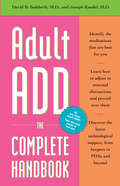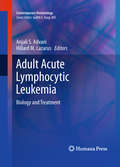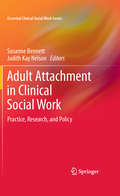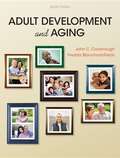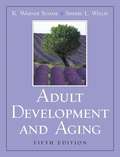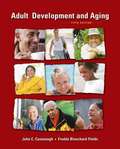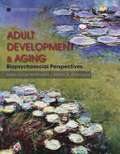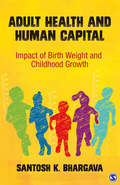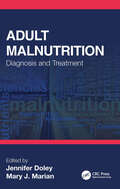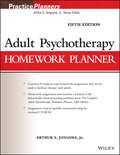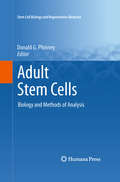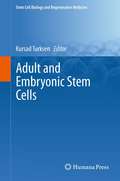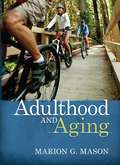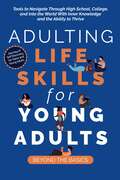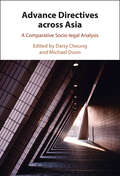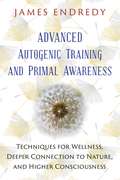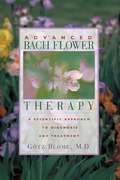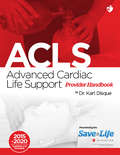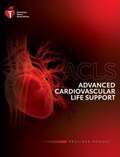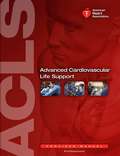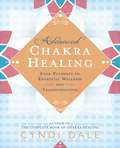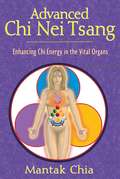- Table View
- List View
Adult ADD, The Complete Handbook: Everything You Need to Know About How to Cope and Live Well with ADD/ADHD
by David Sudderth Joseph KandelImpulsivity, hyperactivity, inattention and distractability—words that ring a bell? For the estimated six million Americans suffering from Attention Deficit Disorder, such words interfere with daily life! For another 40 million people, such words alone make them think they have ADD. A disorder that doesn't go away on its own, ADD turns untreated children into frustrated adults. And, adults who have children with ADD, probably have it as well. From the co-authors of Migraines: What Works! and Back Pain: What Works! (both Prima), comes Adult ADD—The Complete Handbook. Although ADD books have appeared on bestseller lists before, this is the first ADD book ever written by neurologists. In simple and friendly terms, co-authors David Sudderth and Joseph Kandel offer help to those leading frustrating lives. They provide coping mechanisms, both psychological and an up-to-date guide to the latest technology that people with ADD will benefit from.
Adult ADHD: A Reader-Friendly Guide (2nd edition)
by Michele Novotni Thomas A. WhitemanInformation about attention deficit, hyperactivity disorder in adults.
Adult Acute Lymphocytic Leukemia: Biology and Treatment (Contemporary Hematology)
by Hillard M. Lazarus Anjali S. AdvaniThe current explosion of new areas of controversy in the treatment of acute lymphocytic leukemia in adults and young adults makes this comprehensive book a much needed reference for hematologists and oncologists. This book assembles leading authorities from around the globe to cover the full spectrum of ALL subtypes and their treatments. Specific topics of discussion include indications for allogeneic bone marrow transplant in first complete remission, the role of minimal residual disease in making treatment decisions, the treatment of young adults, and the treatment of Philadelphia chromosome positive ALL with the advent of the tyrosine kinase inhibitors. This is the first book to focus exclusively on the adult ALL patient. It provides a complete overview of diagnosis, molecular pathogenesis, evaluation, and treatment for this important patient population.
Adult Attachment in Clinical Social Work: Practice, Research, and Policy (Essential Clinical Social Work Series)
by Judith Kay Nelson Susanne BennettThe applicability of attachment theory and research to social work and social policy relating to infants and children is well-established. Yet, its usefulness for enhancing the understanding of adults and their needs, both individually and as a group, has been less featured in the attachment literature. Adult Attachment in Clinical Social Work Practice is a wide-ranging look at attachment theory and research, its application to adults, and its natural fit with the social work profession. This edited volume covers the applicability of adult attachment theory to the clinical social work profession's various domains that include human behavior, practice, policy, research, and social work education. It addresses the broad spectrum of clinical social work, including practice in a variety of public and private settings and with a number of diverse populations, including racial-ethnic groups, gays and lesbians, trauma survivors, and child welfare parents. The book highlights the underemphasized contribution of the social work profession to the development of attachment theory and research.
Adult Development and Aging
by John C. Cavanaugh Fredda Blanchard-FieldsWritten within a bio-psychosocial framework, Cavanaugh and Blanchard-Fields' best-selling text covers the specific ages-stages of adult development and aging. In its unparalleled coverage of current research and theory, the authors draw clear connections between research and application. The book's focus on ""positive aging"" and the gains and losses people experience across adulthood distinguish it from its competitors.
Adult Development and Aging (Fifth Edition)
by K. Warner Schaie Sherry L. WillisThis comprehensive book helps readers process a clear picture of adult development and aging with the help and results of intensive scientific research. It challenges common stereotypes about this subject matter, and interprets the research data into an optimistic yet realistic appraisal of the many problems faced by the elderly in today's society. Chapter topics look at independence and intimacy in young adulthood; responsibility and failure in the middle years; the reintegration or despair of later life; research methodology; families; careers; personality development; learning and memory; intellectual and biological development; mental disorders; and death and bereavement. For individuals who want to view the potential richness of life--at all stages, and/or understand the lives of older adults they may care for.
Adult Development and Aging (fifth edition)
by John C. Cavanaugh Fredda Blanchard-FieldsHaving a solid grounding in research and theory about Adult Development and Aging is essential even for understanding the evening news.
Adult Development and Aging: Biopsychosocial Perspectives (4th Edition)
by Susan Krauss Whitbourne Stacey B. WhitbourneThe fourth edition continues to provide psychologists with a fresh and engaging approach to the field of psychology of adult development and aging. It focuses on three themes: a multidisciplinary approach, positive images of aging, and the newest and most relevant research. Recent articles and updates to the information on demography, economics, and public policy are presented. The Aging in the News feature includes a story of a remarkable achievement by a middle-aged or older adult. The Assess Yourself boxes are also updated with new questions. Psychologists appreciate this mix of examples and discussions that make the material come to life.
Adult Education and Health
by Leona EnglishThis comprehensive introduction to the study and practice of health and adult education provides the missing link for those seeking to better integrate their efforts in these two areas. Bringing together a distinguished interdisciplinary group of scholars and practitioners, the book speaks clearly to how teaching and learning insights can be used to improve health in clinical, higher education, and community settings.Along with a broad overview of concepts and strategies in the field, Adult Education and Health includes illustrative practical examples from a variety of contexts and a helpful glossary of key terms. It will be a useful resource for professionals and academics in many areas, including community health education, health policy, First Nations health, and the education of health professionals.
Adult Health and Human Capital: Impact of Birth Weight and Childhood Growth
by Dr Santosh K BhargavaToday when the world is looking towards India as a human resource capital, the quality of such resource becomes a global concern. This book studies the relation between aberrant growth, adult diseases, and human capital, and recommends growth monitoring as a tool for human capital development. The growth in the first two years after birth is crucial—it contributes to better schooling, adult stature, income generation, and birth weight in the next generation. The book shows that recognition of aberrant growth and timely intervention can combat not only childhood morbidity but also adult diseases such as diabetes, obesity, and hypertension, which can affect the next generation. The book refers to data from an ongoing cohort study, started in New Delhi in 1969, and finds that growth monitoring can have great intergenerational impact in India, where both childhood and adult morbidity are very high. Its contribution can be immense, given the impact on the future generation of Indians.
Adult Hydrocephalus
by Daniele RigamontiAdult hydrocephalus is an insidious yet treatable condition that develops slowly, with usual onset around 60 years of age. It is poorly recognized and many cases are not diagnosed until late in the course of disease, leading to poorer patient outcomes and a high financial cost to healthcare providers. The resulting neurological symptoms include gait/balance problems, loss of bladder control, and a cognitive decline leading to dementia, which is often mistaken for Alzheimer's disease. This book - the first published on this topic since 1993 - provides comprehensive guidelines to improve the speed and accuracy of diagnosis, and covers various neurosurgical techniques used to treat the disease, including the insertion of different types of shunts and endoscopic third ventriculostomy. This is essential reading for neurologists, neurosurgeons, family physicians, and radiologists who may well encounter adult patients with hydrocephalus more often than they realize.
Adult Malnutrition: Diagnosis and Treatment
by Jennifer MarianMalnutrition is a global health problem and results in significant clinical and financial consequences for people, communities, and healthcare institutions. Causes of malnutrition are often complex and multifactorial, and can include acute illness or injury, chronic disease, and a variety of socioeconomic factors. While many professional articles have been published on malnutrition, there is no single source of information that encompasses all aspects of the condition. Adult Malnutrition: Diagnosis and Treatment reviews the risk factors and etiologies of malnutrition, as well as screening, assessment, diagnosis, and treatment to aid healthcare professionals in the identification and successful care of individuals with this condition in a variety of settings. Features Discusses how to identify malnutrition risks through the use of validated nutrition screening tools in diverse settings Provides detailed instructions on conducting a nutrition-focused physical exam, including illustrations depicting differing degrees of muscle wasting and fat loss Presents information on risk factors, diagnosis, and treatment of vitamin and mineral deficiencies, including photos illustrating signs of deficiency to aid in diagnosis Details treatments for malnutrition related to acute illness/injury, chronic illness, social/environmental circumstances, or starvation Reviews challenges and potential solutions to malnutrition identification and treatment in healthcare institutions Edited by Jennifer Doley, MBA, RDN, CNSC, FAND, and Mary Marian, DCN, RDN, CSO, FAND, FASPEN, this book serves as a key text for registered dietitian nutritionists, health practitioners, and clinicians.
Adult Psychotherapy Homework Planner
by Arthur E. Jongsma Jr.New and updated assignments and exercises to meet the changing needs of mental health professionalsThe Adult Psychotherapy Homework Planner, Fifth Edition provides you with an array of ready-to-use, between-session assignments designed to fit virtually every therapeutic mode. This easy-to-use sourcebook features:92 ready-to-copy exercises covering the most common issues encountered by adult clients including such problems as chronic pain, family conflict, and anxietyA quick-reference format--the interactive assignments are grouped by behavioral problems including depression, low self-esteem, panic, dependency, eating disorders, and phase-of-life problemsExpert guidance on how and when to make the most efficient use of the exerciseAssignments cross-referenced to The Complete Adult Psychotherapy Treatment Planner, Fifth Edition--so you can quickly identify the right exercises for a given situation or problemA CD-ROM contains all the exercises in a word-processing format--allowing you to customize them to suit your and your clients' unique styles and needs
Adult Stem Cells: Biology and Methods of Analysis (Stem Cell Biology and Regenerative Medicine)
by Donald G. PhinneyThis is comprehensive overview of a vital area of scientific enquiry, which covers a broad spectrum of issues. With contributions from some of the key researchers in the field, Adult Stem Cells: Biology and Methods of Analysis offers readers a historical perspective as well as unique insights into cutting-edge thoughts. The volume contextualizes the recent discovery of stem/progenitor cell populations resident in many adult tissues and organs. It confronts the complexities scientists face in trying to validate these cells, while it also describes and critically evaluates the methods currently used to assess stem cell self-renewal. The chapters also seek to distinguish this process from other aspects of cell survival, such as the regulation of life span, senescence, and immortalization at a molecular level. The monograph begins with a section that examine the basic biology of adult stem cells, including chapters on the emerging role of microRNAs in regulating their fate and the molecular mechanisms that govern their self-renewal, the book moves on to analyze the varying methodologies employed in characterizing these elusive elements of our genetic make-up. The second section details in-vivo lineage tracing of tissue-specific stem cells, explores the neural stem cell paradigm, and considers the function of ABC transporters and aldehyde dehydrogenase in adult stem-cell biology. The final section shifts the focus to the life-span regulation and immortalization and features a chapter on the cancer stem cell paradigm. This is an authoritative volume on one of the frontiers of genetic research, and will serve as a valuable resource, not just for established scientists but also for those now entering the field of stem cell biology.
Adult and Embryonic Stem Cells (Stem Cell Biology and Regenerative Medicine)
by Kursad TurksenThis volume will cover a series of reviews on stem cells including adult and embryonic stem cells. Speakers were invited to present these talks during the Stem Cell Symposia in fall of 2010, in Samsun, Turkey. Unique aspect of this volume is that it brings a multidisciplinary aspect of stem cells extracted from a symposium.
Adulthood And Aging
by Marion G. MasonFor undergraduate courses in Adulthood and Aging, Gerontology, and Adult Development. This text provides an engaging perspective on the issues, challenges, and joys of adult development and aging. It provides a balanced and integrated treatment of young, middle, and later adulthood, concluding with a discussion of life satisfaction and quality of life issues. More than ever there is a need to inform those who will be therapists, health care professionals, social workers, and all others who plan to work with adults in some capacity of the challenges and opportunities that often come our way in adulthood. In addition, this text covers areas which are often neglected, such as self development and individual differences, life-long learning, community and political life, and values and moral development. The addition of these and other topics, along with a positive-growth focused perspective sets this book apart from other textbooks in this area that have grown out of gerontology backgrounds with a focus on physical decline and illness. The pedagogical features of the book direct students to key information, and the special features engage the reader in current ethical dilemmas and life-planning issues.
Adulting Life Skills for Young Adults: Tools to Navigate Through High School, College, and Into the World with Inner Knowledge and the Ability to Thrive
by Jaqui MeyerThe ultimate adulting guide for every teen and young adult – empower yourself with over 15 life skills today! Let’s face it, adulting is hard. While this might sound like a cliché, it does ring with truth. The moment your childhood years come to an end, you face a transitionary period of life – the teenage years – when you have to figure out where you fit. And in all this, you also need to struggle with the idea of living independently, preparing yourself for the life ahead. Figuring out your career, managing your finances, and making sense of your whole life – very likely on your own – this period of your life easily becomes a headache. Think for a moment… how would you rate your skills in managing time, money, and your emotions – all on your own? Or how about navigating through everyday problems and achieving a balanced life without family support? According to a survey by the Bank of America, many teens and young adults agree that adulthood truly begins when you can live independently, find a job, pay for your expenses, and stop relying on your family for financial support. Unfortunately, throughout your school life, you are never handed a map that can help you navigate the challenges of adult life with ease.
Advance Directives Across Asia: A Comparative Socio-legal Analysis
by Michael Dunn Daisy CheungThis book is the first to consider comprehensively and systematically the law and practice of advance directives across Asia. It will thus be important not only as a reference volume that documents how advance directives are regulated and used throughout Asia, but also as an exploration of the concept of the advance directive itself, in context. By examining how advance directives operate in Asian countries, we will also shed light on the principle of personal autonomy in this context, alongside other values and religious and socio-cultural factors that shape health and care decision-making. As such, this book will have broad appeal not only to Asian scholars, students, policymakers and practitioners in the fields of health law and ethics and end-of-life care more generally, but will also be of wider interest to an international academic audience in the fields of law, ethics and health and social care research. This title is also available as open access on Cambridge Core.
Advanced Autogenic Training and Primal Awareness: Techniques for Wellness, Deeper Connection to Nature, and Higher Consciousness
by James EndredyA step-by-step guide to optimize health, reconnect with Nature, and access the vast knowledge of the universe through autogenic training • Provides step-by-step instructions for 40 autogenic and primal mind techniques • Explains how to add healing affirmations and visualizations to autogenic practice as well as work with colors and chakras • Includes techniques to restore our primal connection to the world of Nature through practices such as Forest Bathing, Nature’s Breath, and Feeling in the Dark Developed by German doctor Johannes Schultz in the early 20th century, autogenic training teaches you how to use the mind-body connection to influence and regulate the body’s normally involuntary autonomic functions by passively tapping into your central and peripheral nervous systems. Often used for stress relief, autogenic training can also be used for asthma, chronic pain, migraines, constipation, anxiety, panic attacks, and a host of other conditions. In this book, James Endredy takes autogenic training to a new level, revealing how to use AT practices to optimize health as well as reawaken your senses, reconnect with Nature and tap into the vast knowledge and power of the universe. Beginning with the 7 standard formulas of AT, the author provides step-by-step instructions for 40 AT and primal mind techniques. He explains how to add specific healing affirmations and visualizations to your AT practice as well as how to work with colors and the chakras. He offers advanced trainings to rekindle your primal touch sensitivity, experience enhanced sight and hearing, and awaken your primal sense of smell. He reveals how to use AT to restore our primal connection to the world of Nature through practices such as Forest Bathing, Nature’s Breath, and Primal Fire Connection. Drawing on more than 25 years of experience living and working with indigenous cultures, including the Huichol, Iroquois, Sioux, Maya, and Hopi, Endredy shows how, much like a vision quest, this unique combination of AT and primal mind awareness offers rites of passage sorely missing from modern life. It gives you the tools to go deeper into your physiological being, to directly experience how we relate to the world, and to reconnect with the ancient wisdom within each of us.
Advanced Bach Flower Therapy: A Scientific Approach to Diagnosis and Treatment
by Götz BlomeA major advancement in the scientific use of flower essences. • Lists 200 clinically proven combinations of Bach Flower essences for treating specific conditions. • Targets the source of problems, not their outer manifestations. Each of us has a unique psychic structure that affects our emotions, thoughts, and actions. We can develop harmoniously or have unbalanced reactions that can cause illness and psychosomatic conditions. The strength of Bach Flower therapy lies in its ability to treat these pathologies, restore balance, and free us from the physical manifestations of problems that are often psychic and emotional in origin. An indispensable addition to existing Bach Flower works, Advanced Bach Flower Therapy contains three significant new features that are essential for reliable diagnosis and treatment, and make practical use much easier: • A new comprehensive, psychologically sensitive explanation for each individual remedy • A detailed description of more than 200 proven combinations that target the source of the problem rather than simply addressing its symptoms • A comprehensive repertory of symptoms and illnesses with extensive advice and suggestions for treatment User-friendly and scientifically rigorous, Advanced Bach Flower Therapy is the most important tool yet for anyone wishing to develop a deeper understanding of the benefits of floral essences.
Advanced Cardiac Life Support: Provider Handbook
by Dr Karl DisqueThe Save a Life Initiative has just released its newest course: Advanced Cardiac Life Support (ACLS). This manual is based on the 2015-2020 Advanced Cardiac Life Support guidelines published by the American Heart Association. The Advanced Cardiac Life Support (ACLS) Provider Handbook is a comprehensive resource intended for health care professionals currently enrolled in an Advanced Cardiac Life Support Certification or Recertification Course. It serves as the primary training material for ACLS Certification and Recertification courses. Although it is primarily intended for use during their courses, the handbook was also created to serve as daily reference material for health care professionals. Information covered in the handbook includes ACLS instruction for adults and children through multiple case scenarios. Case scenarios include, but are not limited to, respiratory arrest, ventricular fibrillation and bradycardia. Specific ACLS Algorithms and more are also included within the handbook. All material included in this handbook is delivered in a manner meant to enhance learning in the most comprehensive and convenient way possible.
Advanced Cardiovascular Life Support: PROVIDER MANUAL
by American Heart Association"The ACLS Provider Manual contains all of the information students need to know to successfully complete the ACLS Course. The ACLS Provider Manual is designed for use by a single user and as a student reference tool pre-and post-course. It is also used as a clinical reference. This manual includes the systematic approach to a cardiopulmonary emergency, effective team communication, and the ACLS cases and algorithms. The ACLS Provider Manual includes the ACLS Reference Card Set (product 20-1120; also sold separately). This product has been updated with new science from the 2020 Guidelines for CPR and ECC and replaces the previous version (15-1005)"
Advanced Cardiovascular Life Support: Provider Manual
by American Heart AssociationHealthcare providers use a systematic approach to assess and treat arrest and acutely ill or injured patients for optimum care. The goal of the resuscitation team's interventions for a patient in respiratory or cardiac arrest is to support and restore effective oxygenation, ventilation, and circulation with return of Intact neurologic function.
Advanced Chakra Healing: Four Pathways to Energetic Wellness and Transformation
by Cyndi DaleRemove Energy Blocks and Achieve True Healing through the Four PathwaysJoin world-renowned energy healer and bestselling author Cyndi Dale as she provides a comprehensive guide to energy and chakra work using the four pathways healing system. The concepts and techniques of this potent approach are designed to be totally aligned with divine love so that you can achieve the awakened state that brings true healing.Featuring nearly fifty hands-on exercises and a full-color insert, this book shows you how to negotiate the pathways—elemental, power, imaginal, and divine—through the subtle energy organs known as the chakras. You will explore the energy patterns and programs that underlie imbalances and illness and learn methods for energy mapping as well as Cyndi's signature Spirit-to-Spirit practice. The four pathways are interconnected and dynamic, so when you transform one you transform them all, leading to healing outcomes that are based in the unifying energy of love.Foreword by Dr. (Doc) C. Michael Scroggins, PhD,CEng, CMarEng, FIMarEST
Advanced Chi Nei Tsang: Enhancing Chi Energy in the Vital Organs
by Mantak ChiaAdvanced Taoist techniques for detoxifying and rejuvenating the internal organs through the release of negative chi • Works with the navel center, where negative emotions, stress, and illness accumulate • Presents advanced techniques to release negative energy from the body and reestablish a healthy flow of vital energy to internal tissues and organs From the Taoist point of view, good health depends upon the free flow of chi--healthy life-force energy--throughout the body. Taoists refer to healthy chi as good wind. When energy is trapped in the body it stagnates and becomes negative, manifesting in the symptoms of physical or emotional illness. Taoists call this negative energy sick or evil wind. The advanced Chi Nei Tsang practices focus on mastering these winds. They include techniques for developing sensitivity to sick winds, releasing internal energy blockages, and chasing sick winds from the body to reestablish a healthy flow of energy. Negative energies caused by stress, tension, and the effects of past illnesses tend to accumulate in the naval center, so the advanced Chi Nei Tsang techniques use elbow pressure on specific reflex points around the navel to release energy blockages associated with each internal organ. They also work with wind access points found near the standard acupuncture points. These advanced practices build upon the organ detoxification and rejuvenation practices introduced in Chi Nei Tsang, allowing the practitioner to work intensively at an energetic level toward the restoration of optimum health and well-being.
